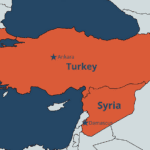Summary by News About Turkey (NAT)
The ousting of Omar al-Bashir in 2019 disrupted the strong relationship Turkey had cultivated with Sudan during his rule, leading Ankara to adopt a more cautious stance. This period of political instability in Sudan coincided with increased influence from regional rivals like Egypt, the UAE, and Saudi Arabia. The outbreak of conflict between the Sudanese Armed Forces (SAF) and the Rapid Support Forces (RSF) in 2023 further solidified Turkey’s cautious approach, as it sought to balance relations with both sides, focusing on mediation, humanitarian relief, and maintaining economic ties.
Turkey’s earlier engagement with Sudan, particularly under al-Bashir, involved strategic agreements like the rehabilitation of Suakin Island. These moves, however, drew criticism and heightened tensions with Egypt and Gulf states due to Turkey’s perceived alignment with the Muslim Brotherhood. After al-Bashir’s fall, Sudan’s transitional government distanced itself from Turkey, reassessing agreements and aligning more closely with Gulf powers.
In the present context, Turkey’s mediation efforts in Sudan reflect its focus on fostering stability to safeguard its investments, which have faced numerous setbacks, including stalled infrastructure, energy, and mining projects. Despite these challenges, Ankara has leveraged soft power tools, such as humanitarian aid and medical diplomacy, to maintain its influence.
The recent normalization of relations between Turkey and Egypt presents an opportunity for collaboration in Sudan. Both nations share an interest in Sudan’s stability—Egypt to secure Nile water resources and Turkey to protect its economic investments. This rapprochement could enhance their strategic coordination, particularly in countering Iran’s growing involvement in Sudan, which threatens to destabilize the region further. However, competition with Gulf-led peace initiatives and Iran’s dual support for SAF and RSF complicates these efforts.
Regional dynamics also present challenges. Turkey’s closer alignment with Egypt may strain its strategic partnership with Ethiopia, particularly amid ongoing disputes over the Grand Ethiopian Renaissance Dam. Sudan’s conflict also risks spilling over into Libya, where Turkey seeks to preserve fragile stability against the backdrop of links between Libyan and Sudanese actors.
While the Turkey-Egypt rapprochement offers potential for coordinated action in Sudan, the depth and sustainability of their cooperation will depend on navigating entrenched rivalries, conflicting interests, and external pressures. Effective diplomacy and recalibrated regional strategies will be essential for both nations to achieve stability in Sudan and broader geopolitical gains.
Read the full article here.



